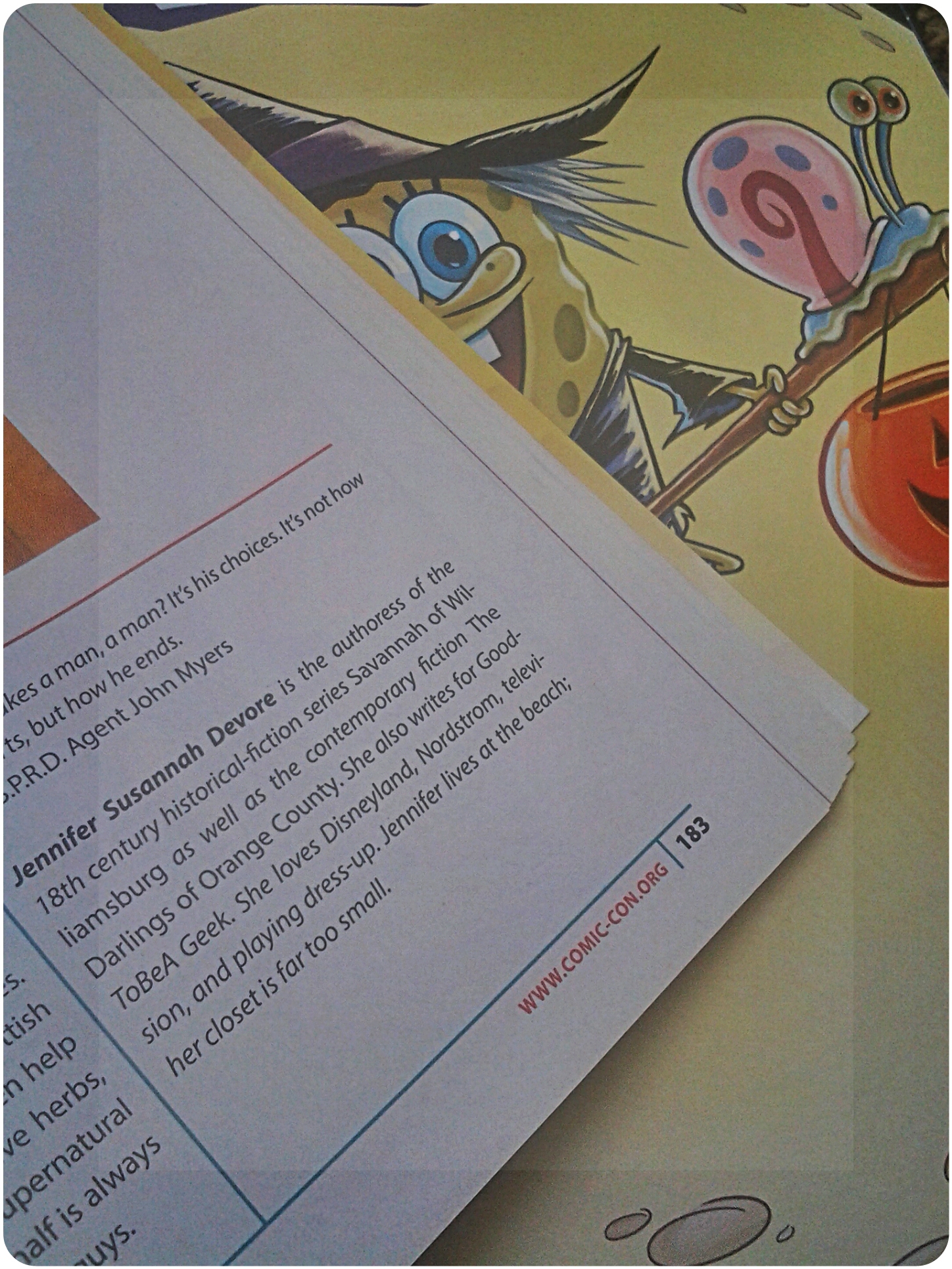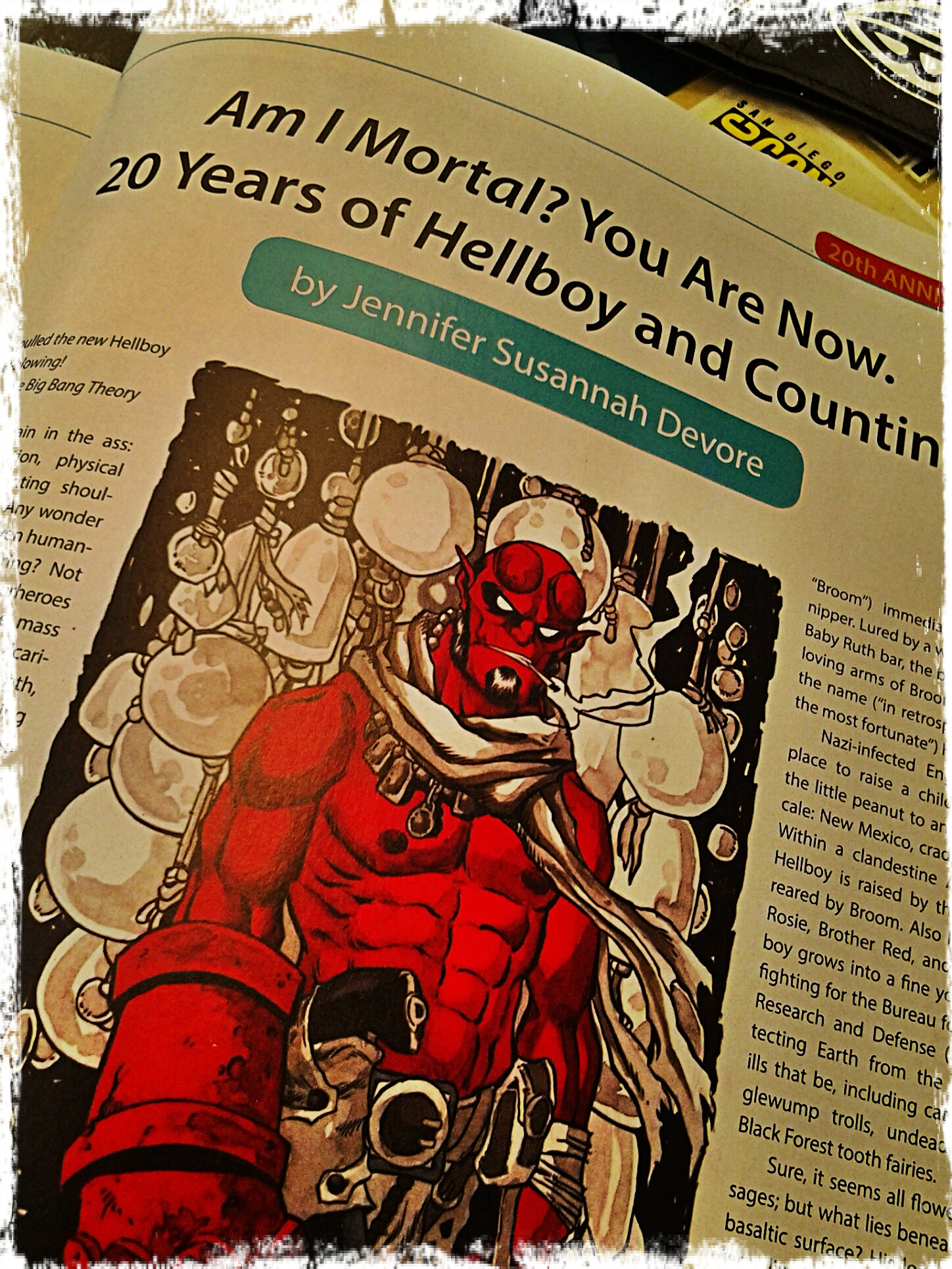An analog birth during the San Diego summer of 1993, Hellboy sparked fictively from the NorCal mind of Mike Mignola during the English spring of 1574. Hellboy's mum was Sarah Hughes, a troubled teen ascended from witches; Pappy was Azzael, a demon high enough in Satan's ranks he's what the Mob calls "made". Sprinkle some German Occult-literature, add carnal, Teutonic Dark Arts, cap it with a midnight ride on the neighborhood goat-demon and … It's a (half-human/half-demon) Boy!
After that wild night in '74, waiting nearly four-hundred years in the netherworld, probably playing with Star Wars Legos, Romanov-family soothsayer Rasputin finally summoned the wee Anung un Rama, during the already very busy Christmas season of 1944. For Der Führer and his Nazi cretins, this magic trick was their anti-Hail Mary, a ritualistic conjuring of Ragnarök: the Norse foretelling of the world's demise and rebirth. A Doomsday subcontractor commissioned by Hitler in a last-ditch effort to save his WWII bacon, Rasputin invoked the child effectively, yet input the wrong GPS coordinates. Rather than the Nazi-laden, party-ready Scottish isle, the demon babe was spewed via impressive pyrotechnics amidst church ruins in East Bromwich, England.
With big eyes and a high forehead, not unlike Tyra Banks or Sheldon Cooper, the wee bairn worked its evolutionary wiles -those saving babies from abandonment in the wild- on the British Paranormal Society and a big-hearted detachment of U.S. Army Rangers. Further coaxed by evolution and the magical smell of a baby's head -dry roasted peanuts- Professor Trevor Bruttenholm (a.k.a. "Broom") immediately takes to the nipper. Lured by a warm blanket and a Baby Ruth bar, he leaps into the loving arms of Broom, whom gives him the name, "in retrospect, perhaps not the most fortunate", Hellboy.
Nazi-infected England being no place to raise a child, Broom sallies the little peanut to an appropriate locale: New Mexico, cradle of the weird. Within a clandestine Air Force base, Hellboy is raised by the military, but reared by Broom. A.K.A. Red, Rosie, Brother Red and Peanut, Hellboy grows into a fine young creature, fighting for the Bureau for Paranormal Research and Defense (B.P.R.D.), protecting Earth from the supernatural ills that be, including cat-eating Fragglewump trolls, undead Nazis and Black Forest tooth fairies.
Sure, it seems all flowers and sausages; but what lies beneath Hellboy's basaltic surface? His longevity has no term-limits; yet he can still fall to injury, despair and eventual death via extreme physical attack, heartbreak or even his greatest foil, his own temper.
"Sometimes I get angry. And when I get angry I sometimes do stupid things. Things like charging headlong into a pitch black room. I'm tougher and stronger than any human, but I can't see any better in the dark," he first admits in Hellboy: Seed of Destruction #1.
His heart isn't any stronger either. Spending his life protecting humans, and cats, what happens to that big, red heart when it aches for their pain, or eventual loss?
In Dark Horse Comics, Hellboy is sired via Satanic ritual, generated in moody, fictive East Bromwich. In real life, he is conceived from Mike Mignola's psyche, hatched in sunny San Diego on the floor of Comic-Con in 1993, with half the mess and fanfare of the East Bromwich incident. Appearing first in San Diego Comic-Con Comics #2 (1993), Hellboy timorously stepped onto the stage, far less buff than today; obviously, he's been working out. In fact, the clearest connection between the original and today's snarky yet affable cranky pants, is his name.
In the early-1980s, when Doctor Who incarnations included posh Peter Davison and Willie Wonka-wannabe Collin Baker, Mignola was inking for Marvel Comics. Later that decade, when Sylvester McCoy's quasi-Riddler played The Doctor, Mignola was playing for both teams: inking at Marvel (The Incredible Hulk, Daredevil); drawing/producing at DC (Gotham by Gaslight, Batman: A Death in the Family).
By the 1990s, as Paul McGann sashayed through the Who-niverse as The Oscar Wilde Doctor, Mignola finally tired as gun-for-hire. Strong nudging from Mike Richardson at Dark Horse Comics led Mignola to "quit working on other people’s properties and start creating his own." Cut to Richardson at a "now-forgotten comics convention" where Mignola hands him a packet, capitulating, “Okay, I’ve got a book for you … It’s called Hellboy.”
In 1994, Mignola, Richardson and Dark Horse issue the graphic novel Hellboy: Seed of Destruction, the later-groundwork for Guillermo del Toro's 2004 feature-film Hellboy. (Editor's note: Mignola regards the Seed of Destruction miniseries as the true start of the series, thus the 20th anniversary occurring in 2014, not 2013.)
Since then, Hellboy has fathered myriad offspring: films, animated series, spin-offs (Abe Sapiens, Sledgehammer, B.P.R.D., Lobster Johnson), novels, toy lines, video games and beyond.
Gilgamesh, Merlin, Aragorn, Spock and even the hot, boho witches of Charmed, human-hybrids one and all, suffer a special brand of angst. When Kirk queries, "You're only half-Vulcan, what about the human-half?", Spock replies, "It is proving to be an inconvenience, but it is manageable."
Anne Rice's hesitant vampire, Louis, cannot release his humanness, feeding instead on rats and, eventually, villains; whilst Luke Skywalker briefly fights the Dark lure, a battle his father Anakin loses. The tug of war can be great, even in those with whom the force is strong. Only Spaceballs' Barf the Mawg (half-man/half-dog) really gets it, accepting his condition joyfully, stating, "I'm my own best friend!"
Page-to-screen adaptations brim with conflcits. Hellboy is no different. Notably is Hellboy's identity: comics allow life amongst the people, sans question; films cache him from the public, proving difficult in the YouTube era. Strongest link amongst Hellboy iterations? A human element in a fundamentally wicked creature. "We all have a side we try to hide," sympathizes Agent Myers in del Toro's Hellboy.
Hellboy doesn't struggle with his demons, so much as he is aware of them. He is also aware he's ugly. "I wish I could change this, but I can't," he gestures to his visage, apologizing to his film love-interest, the beauteous, power-incontinent pyro, Liz Sherman.
"He's complicated," comics-enthusiast Lesli Thyra suggests. "He's trying to fit into a human world and find acceptance. A creature from hell, he's strongly influenced by his adoptive, human father. He's also a protector of the human race, but must be kept secret, which makes his need for acceptance difficult."
"Do you need everyone to like you? Everybody? Or, am I enough?" Liz wonders in Hellboy II: The Golden Army, as Red realizes, upon saving Manhattan from a destructive forest god, and saving a baby, the people not only dislike him, they fear him.
As Red endeavours to rid Manhattan of the varmint, Prince Nuada, master of said-varmint, argues for its life. "Demon, look at it. The last of its kind. You have more in common with us, than with them. You could be a king."
Whispering to Red later, Nuada's dying words tap into a nerve, "The humans, they will tire of you. They have already turned against you. Leave them. Is it them or us? Which holocaust should be chosen?" Not a happy ending, either way.
Still, endings must come. Hellboy: The Fury #3 saves the world, but kills Peanut. Happily, superheroes rarely, truly die; this one merely moves south of the border. Hellboy in Hell just brings a new POV, a Lovecraftian multiverse of new characters, relationships and exploits.
"I always say that when characters die in the Hellboy universe, they just become more interesting," Mignola told Comic Book Resources' Kiel Phegley. "So Hellboy now is a lot more interesting. I just felt he'd run his course as the guy who everybody knows."
Superhero life is not always a bowl full of kitties. Mortal loved ones fade in the blink of an eye, Scottish Fragglewumps will always eat cats and Heaven help you if you're caught without your protective herbs, rosary or troll-terrorizing canary. The supernatural-half seems glamourous; but the human-half is always worth fighting for … at least for the good guys.
What makes a man, a man? It's his choices. It's not how he starts, but how he ends.
- B.P.R.D. Agt. John Myers

- Jennifer Susannah Devore is the authoress of the 18thC. historical-fiction series, Savannah of Williamsburg as well as the contemporary-fiction, The Darlings of Orange County. She loves Disneyland, Nordstrom, television and playing dress-up. Jennifer lives at the beach; her closet is far too small.
End of article.
Note: Yours Truly will be covering all the Con shenanigans as part of Rotten Tomatoes' SDCC2014 Twitter feed. Follow along @RottenTomatoes! #SDCC2014
Read all my SDCC Souvenir Book articles here!
Follow @JennyPopCom Twitter and Insta
JennyPop's Amazon Author Page, to boot!




